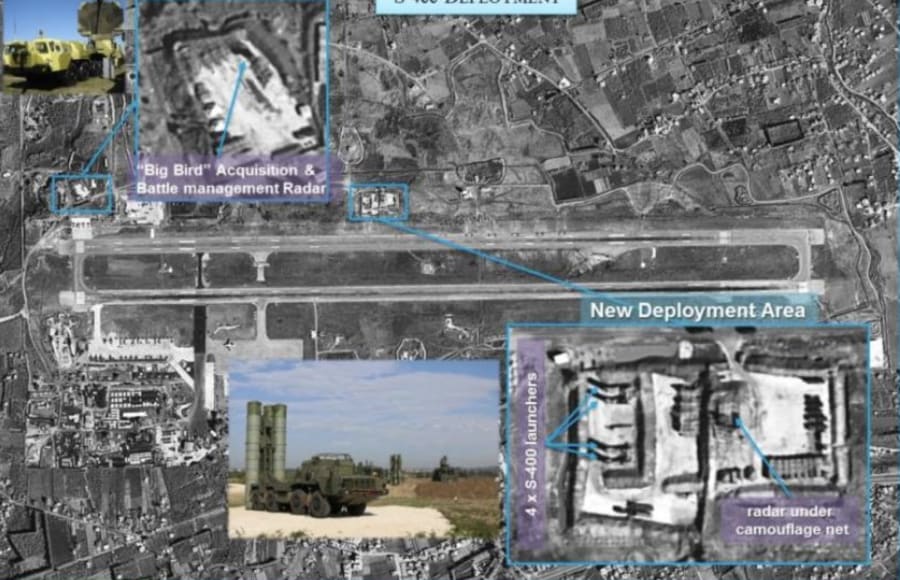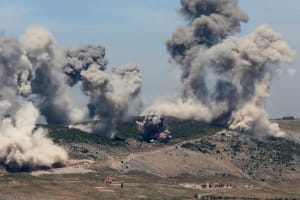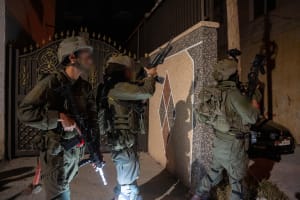What makes the latest supposed Israeli airstrike in Syria different from the previous ones?
While not claiming credit, Israeli Prime Minister Naftali Bennett was blunt: “We are fighting off evil day and night”

The Israeli Air Force reportedly fired missiles at Iranian-affiliated targets in the Syrian coastal city of Latakia on Tuesday, according to the Syrian military.
The missiles hit containers in the port, according to Syrian authorities. In recent years, the Jewish state has conducted hundreds of airstrikes on various military and intelligence targets affiliated with the Iranian regime and its terrorist proxies such as Hezbollah in Syria.
If Israel was indeed behind the Latakia airstrike, it was strikingly different from most previous Israel Air Force operations in Syria. In a word, the dramatic difference is Russia.
The Russian military operates the Hmeimim Air Base outside Latakia and the area is considered strategically important for Moscow’s long-term interests in maintaining a military access to the Mediterranean Sea through its presence in Syria. Consequently, Russia has deployed sophisticated air defense systems in the area to protect its valuable military assets.
Due to the complex ties between Moscow and Jerusalem, Israel usually refrains from striking Iranian-affiliated targets located close to Russian military bases in Syria.
In fact, the Iranian regime has increasingly taken advantage of this complex Russian-Israeli understanding by deliberately moving some of its valuable military assets close to Russian military positions. Only a highly important target would prompt Israel to risk potential tension with Moscow by striking a target close to Russian military positions.
Tony Badran, a Middle East expert and a research fellow at the Foundation for Defense of Democracies, stressed the importance of the Latakia port airstrike.
“If confirmed that this was an Israeli strike on Latakia port, it would be somewhat significant news,” Badran tweeted.
While not directly claiming responsibility for the Latakia airstrike, Israeli Prime Minister Naftali Bennett vowed on Tuesday that Israel would defend itself and its crucial interests in the region.
“We are fighting off the forces of evil in this region, day and night. We will not stop for one second. It happens almost every day. We will continue to act against destructive forces; we will persevere and will not tire,” Bennett said with a barely veiled reference to the Iranian regime and its military presence in Syria.
Bennett delivered his blunt remarks at the eighth trilateral summit between Greece, Israel and Cyprus.
“At the same time, we are strengthening our ties with our friends, in every area,” said Bennett of Israel’s close diplomatic and commercial ties with Greece and Cyprus. The Israeli prime minister’s two dramatically different statements underline the striking contrast between the bright opportunities and the dark threats that the Jewish state simultaneously faces in a complex Middle East region.
While Moscow has expressed understanding for Israel’s need to conduct airstrikes against Iranian targets in Syria, the Russians have also criticized some past Israeli military operations that were considered too close to Russian strategic interests in the region. Former Israeli Prime Minister Benjamin Netanyahu reportedly developed close personal ties with Russian President Vladimir Putin and the two men succeeded in maintaining relatively friendly diplomatic relations between Moscow and Jerusalem.
In late October, Bennett met with Putin in the Russian resort Sochi where the two men reportedly discussed Russian-Israeli ties and the complex situation in Syria. In a rapidly emerging new Middle East with deep divisions between allies and enemies, Russia is neither and is somewhere in the gray zone. On one hand, Russia cooperates militarily with Iran to some extent. On the other hand, Moscow is increasingly frustrated with Tehran undermining Syria’s stability by building a threatening military presence along Israel’s northern borders.
Russian Foreign Minister Sergei Lavrov is scheduled to visit the Jewish state on Sunday for talks with Bennett and Foreign Minister Yair Lapid. While the purpose of Lavrov’s visit to Jerusalem has officially not been disclosed, it is very likely that it is connected to the airstrike in Latakia.

The All Israel News Staff is a team of journalists in Israel.













